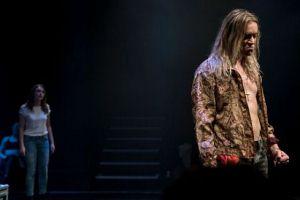Review of new musical 27 at the Cockpit Theatre
The Faustian myth is a well-worn trope of musical theatre, from George Abbott and Douglass Wallop's Damn Yankees (1955) to the recent new British musical Exposure at the St James Theatre. Pacts with the devil, or a figure thereof, provide ample dramatic function for a rise and fall narrative to attach itself to, whether that be baseball or, in the case of 27 "the rise of a falling star", a frank and brutal look at the music industry and the untimely death of various historical figures who have all joined the so-called '27 club'.
"It's better to burn out than fade away" says our tragic hero Orpheus, as he chooses death to be with his girlfriend, turning his back on fame after working so hard by surrendering himself to total submission. Using one industry to attack and highlight faults within another works in some respects but at times this by-numbers approach to his rise and fall threatens to oversimplify the important themes it wishes to raise. The trajectory of his story, his rise to fame, tensions with band mates and fall from grace becomes too obvious, but perhaps that's the point. This is a story that you will recognise right down to the jokes about reality TV and overtly camp fashion designer which has become a staple of every new musical, but as the protagonist hurtles to his pre-determined conclusion, you're made to question why this narrative is allowed to repeat itself so frequently, which in a strange way becomes the piece's main strength.
What book writer and lyricist Sam Cassidy has tried to do to develop this idea further is to vamp on various aspects of Greek mythology, from the three Fates who act as cumbersome narrators to a trip to the underworld which becomes a quasi S&M dungeon where Orpheus must complete a set of riddles. It doesn't always work, and the padding of the second act draws away from the central message. Whilst Orpheus may have been "the rock star of ancient Greece", the parallels conflict and the Greek references aren't always fully realised. There's hints of the Spice Girls musical Viva Forever! in the quest for fame and the absolution of responsibility and even Furth and Sondheim's Merrily We Roll Along as a live TV interview breaks down due to inner conflicts, but unlike the latter that central conflict which is potentially the most interesting becomes quickly overshadowed.
There's little nuance to the book scenes, the script acts only to further the plot rather than develop character, and the dialogue is rarely revealing or developing. Characters become mouthpieces and say only what they mean, and this makes things a little too black or white. Women are either squares like Cassie Compton's woefully underwritten but fiercely sung girlfriend Amy or modern vamps like Lucy Martin's Ms. M, who like George Abbot's Lola acts as the main foil in the protagonist's fall. Ah, the weakness of men you sigh, as the heady world of sex and drugs takes over and sadly it rarely feels fresh.
What raises the show beyond its means is the energetic and fully committed cast who each display excellent vocals, led by Greg Oliver as rock-star Orpheus who has the necessary star quality to always feel authentic. His delivery of the second act opener becomes a musical highlight of the score, and he's well assisted by Ryan Gibb and Ryan Molloy as opposing layers of his conscious. Compton's voice is electric throughout her two stand-out numbers, and despite feeling on the fringes of the narrative and never wholly realised she provides the memorable performance of the evening thanks to her knock-out vocals.
The choreography is impressive and well executed but at times feels more like an MTV dance video than an essential expression of musical theatre. The journey from book into music is rarely natural and never necessary, and the production becomes laden within its own conceit. Matt Wills' score is at its strongest in the quieter, more reflective moments and it's during those points that the piece really shows its dramatic potential.
There's an array of toned shirtless bodies on display that's enough to body-shame you into forgoing your interval ice cream. Another example of the narrative only scratching the surface when it comes to mental health issues concerned with the performance industry - the pressure on performers to have the body of models is a growing and worrying trend in casting, but perhaps that's for another musical to address.
The production threatens to blow the roof off the sometimes inhospitable surrounds of the Cockpit Theatre, with an impressive multi-level set design by Nick Eve that creates a jungle-gym for the characters to play and contort. It's ferociously over lit, feeling more like a rock concert than a fringe theatre production, and the addition of so many lights adds to the insufferable heat which makes for an extremely uncomfortable environment for cast and audience alike.
It's a show with a message, and that message is never subtle or underplayed. There's certainly a wealth of talent on display from all corners, but this show works too hard at showing the shallow nature of fame and in doing so runs the risk of feeling shallow itself. "Join me for the ride or get off" yells Orpheus. I may just have to.
Originally published on
